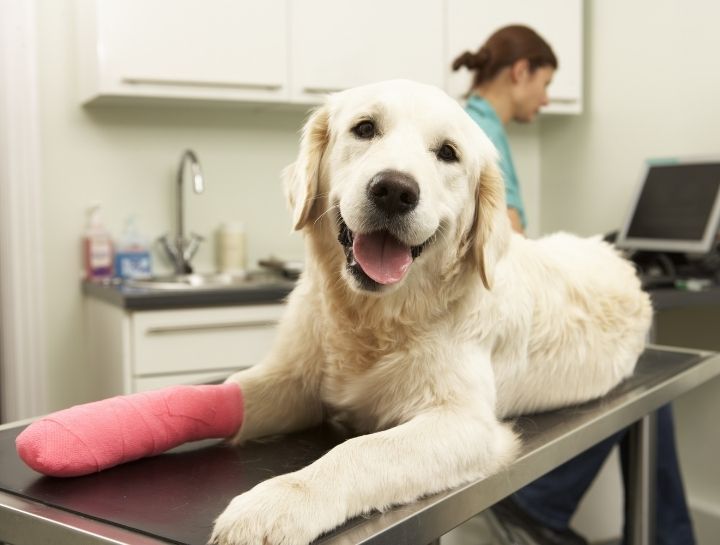Pet Emergencies
Find treatment fast.
During regular office hours, our staff can help you handle the situation.
| Monday-Friday: | 8 am-6 pm |
| Saturday: | 8 am-2 pm |
| Sunday: | Closed |
If you have an emergency, please call: (561) 798-5508. Our after-hours partner, Veterinary Emergency Group, will get you the quickest help available. You will be able to speak with a doctor regarding your concerns.
At our hospital, we have the necessary equipment to treat your pet in an emergency. It is important for you, as a pet owner, to know how to handle an emergency before it happens. Familiarizing yourself with our guidelines and what to do in response to your pet showing signs of distress allows you to remain calm and act quickly should such an occasion arise. It is also important to be aware of how to locate our hospital if you have not been to our location before.
What is Considered a Pet Emergency?
The first step in a pet emergency is deciding the seriousness of your pet’s condition. This can be especially difficult when your pet is acting unwell in the middle of the night. It is hard to know if you need to wait until morning or if your pet needs more immediate attention. By calling our emergency service, you can talk to one of our trained professionals who will help you make the correct decision in the least amount of time, saving you a lot of undo stress and anxiety. Here is a list of signs that your pet needs emergency veterinary care:
Signs of a Real Emergency
- Repeated vomiting or diarrhea
- Blood in vomit or stool
- Your pet is having a seizure
- An injury due to a serious accident
- Your pet is attacked by another animal
- Swallowing an object that is not food
- Difficulty breathing
- Abdominal bloating
- A high fever
All of these symptoms indicate that your pet’s life is in a dire state. You should transport your pet to our hospital right away. If the emergency takes place after hours, call us and a veterinary professional can triage your emergency and when needed direct you to an after-hours facility. They stabilize and treat pets, then refer them back to their regular veterinarian for follow-up care.
No matter the symptoms, if you feel your pet is acting unusual and may need help, we want you to call us.
During normal business hours, we are a full-service veterinary clinic and hospital. This means we provide routine care, wellness exams, minor and major surgeries, diagnosis and treatment of concerns, vaccinations, and more.
What to Expect with Emergency Services
Call First – Even if it is during regular business hours, we always suggest calling first before you arrive, even if it is to warn us of what is coming so we can prepare for your pet’s condition. Giving us a quick call in an emergency allows us to prep everything in advance and be ready the second you arrive. Calling us first also allows us to tell you if you need to do anything to your pet before you transport them. For example, we can instruct you on how to stop bleeding or how to make your pet vomit to clear an obstruction. We can also tell you how to take your pet’s temperature. If you do come to our hospital and we deem your pet is not in an emergency, you will have to wait until other pets are treated first. Knowing this ahead of time can save you from spending time waiting in our office when you could be home.
Medical Record – If you have to triage with another emergency service, that veterinarian will not know your pet’s specific medical history. This is especially the case when you rush them to a different hospital. You should take the time to create a note on your phone or make a computer printout with the dates of their vaccinations and the dosages of any medications they may be taking at the time. Having this information on you makes it easier for the veterinarian to help your pet and takes the pressure of remembering everything in that situation.
Traveling – When you are traveling with your pet, take the time to find out where emergency services are located along the way. If anything were to happen, you would be prepared and know where to go for help. You can also pack a first aid kit for your pet. If an accident or injury occurs on the road, you can tend to your pet, and then take them to the nearest emergency service.
What to Pack for Your Pet When Traveling:
- Food, water, and treats
- Bowls
- Bedding like blankets or soft, portable beds
- Toys that your pet uses at home so they feel comfortable being away
- An extra collar or leash so you always have control over your pet in public places or near busy roads.
- Vaccination records to show a veterinarian in an emergency
- Extra poop bags if you have a dog
- Medical Kit that contains tweezers, gauze, bandages, scissors, alcohol, and antiseptic cream
- Identification and how to contact you if they are mislaid
- A pet carrier or crate to keep them safe or away from other animals
- Any medications

